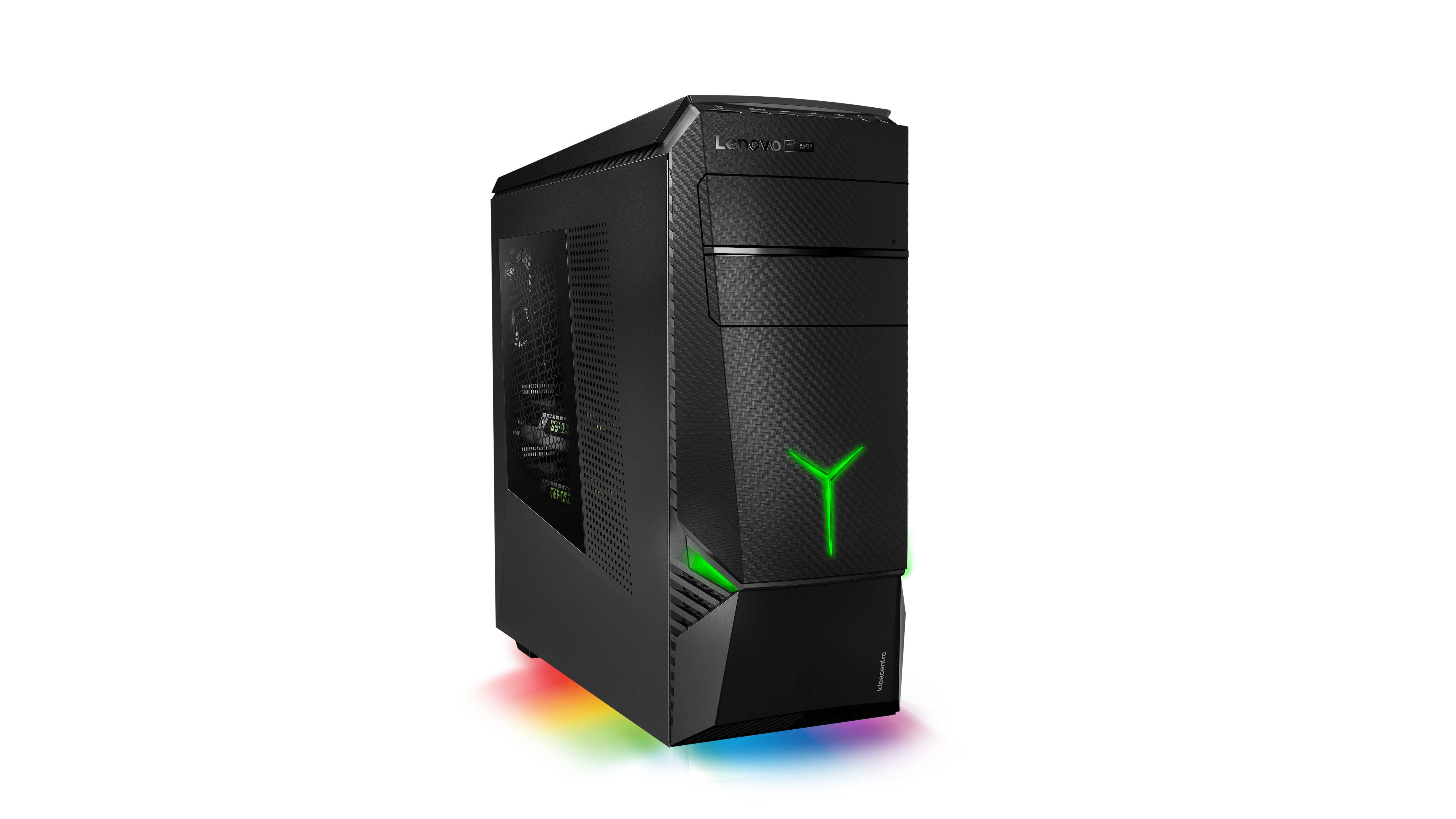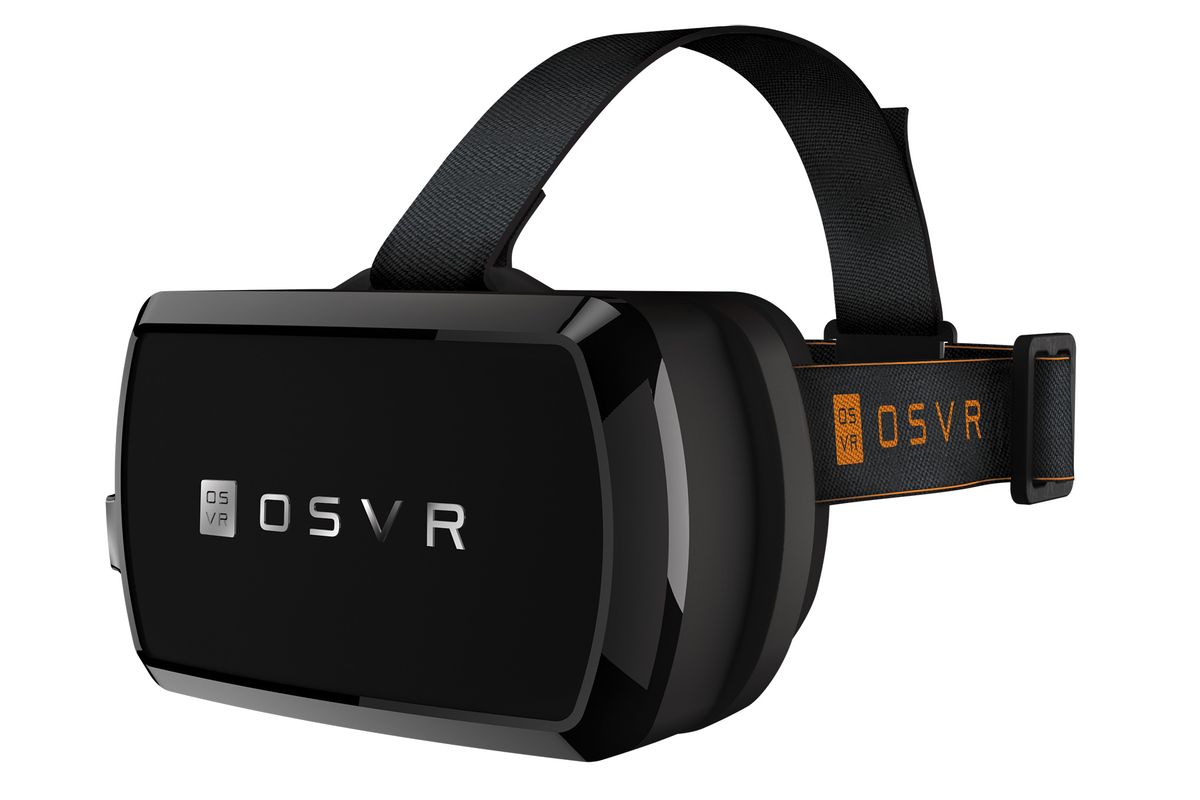Why Are Lenovo And Razer Teaming Up On Gaming? (Spoiler: Maybe VR)
It's not terribly unusual for two companies to partner up when there's a mutually beneficial opportunity. Usually, the upside for both parties are fairly obvious, but when Lenovo and Razer told us that they were going to team up on a fleet of gaming products, we had to think rather hard about it.
Both companies have excellent brand recognition, and both (appear to) do brisk business. Further, some of their product lines overlap -- for example, Razer makes gaming laptops, and Lenovo has a whole line of gaming peripherals now -- so it was not immediately clear what benefit(s) one has for the other.
Reading between the lines, though, we suspect it may have mostly to do with virtual reality.
Vague Words
Backing up a bit, we spoke with Lenovo (Victor Rios, Vice President and General Manager, Workstation BU, Gaming and Industry Solutions) and Razer (Kevin Sather, Razer's Director of Product Marketing) representatives in a conference call where they were to elaborate somewhat on the press release we received announcing the partnership. To be honest, we didn't learn much. The press release is full of vague language, and the Lenovo/Razer folks we talked to didn't provide too many more details, despite our pesky questions.
What we can say with certainty is that the products born of this partnership will be special "Razer" editions of Lenovo's Y-series of gaming products. This will start with a gaming desktop and expand to other areas, including laptops and peripherals. These systems will sport Razer's excellent Chroma lighting and software (no one has specified if that's Razer Synapse, or some custom version of it).
We also know that the first system from the partnership will launch at CES 2016 for Q1.
There is also something to the idea that Razer is known mainly to enthusiasts, whereas Lenovo is favored more heavily by mainstream and workstation types, so the brand awareness of each could grow a bit with a partnership.
Get Tom's Hardware's best news and in-depth reviews, straight to your inbox.
Still, that all seems rather minor, and there's actually a potential negative hit to both companies. There is the fact that Lenovo is now making a full line of gaming peripherals, and based on the answers we got from our call, it doesn't sound like Lenovo is planning to pull those anytime soon. Razer does not appear to be planning on killing off its Razer Blade line of thin gaming laptops either, which seems odd considering that Lenovo's Y-series gaming laptops will have some Razer branding and Chroma.
Altogether, we're not sure this all adds up. So what gives? Why partner?
I Smell VR
I'm speculating here, but it's possible that this simple announcement foreshadows something more exciting: a collaboration on virtual reality.
First of all, we can parse out the language of the press release somewhat. The word "immersive" is used multiple times, particularly to describe Razer's expertise. For example, one passage reads, "Lenovo's engineering expertise merges with Razer's immersive technology to enhance gaming experience."
What is immersive about gaming keyboards and mice and cool backlighting? Nothing. No, "immersive" is a buzzword around VR, and it just so happens that Razer is a force behind the Open Source VR (OSVR) project.
Neither Rios nor Sather threw cold water on that idea, though they wouldn’t confirm anything specific. Maybe there could be some accessory bundling, they noted, and maybe there could be some “deeper work with the ecosystem.” A VR HMD is technically an accessory, and it’s one that Razer already has in its pocket.
We asked whether Lenovo and Razer would work together to create PCs that are qualified for OSVR, and Sather answered by saying that would be cool. That's a non-answer, but it's telling, and it could jibe with this bit from the press release: "Additionally, both companies are looking to jointly double down efforts to fast track the development of new technologies, including gaming experience enhancements." The keywords there are "new technologies" and "gaming enhancements."
VR Makes Sense
We are certain that Lenovo is testing the VR waters; that is to say, the company is definitely exploring it, but we do not believe that Lenovo has necessarily made any solid decisions on exactly how to approach it. However, making friends with Razer and its OSVR technology would be a sensible move in that regard.
Further, this would make sense for more mainstream consumers interested in VR. This coming year will undoubtedly be the Year Of VR -- we expect to be inundated with VR news and products at CES in January, and of course the Oculus Rift, HTC Vive and PlayStation VR are forthcoming -- and any major OEM worth its salt will be looking to cash in lest they be left in the dust.
For a huge company like Lenovo, it could serve more mainstream gamers intrigued by VR; for a successful gamer-focused company like Razer that has the OSVR hot potato, having the world's largest PC maker as a de facto distributor for its VR HMD could help it snatch a large chunk of the about-to-explode VR market away from the flagship HMDs (Rift, Vive, etc.).
A shared stake in VR is what makes the most sense for a Lenovo/Razer partnership. We'll certainly learn more at CES in January, and in the months to follow.
______________________________________________________________________
Seth Colaner is the News Director at Tom's Hardware. He curates and edits the news channel and also writes on a variety of topics. He would have become a professional ultimate Frisbee player, but he was born 15 years too early.
Follow him on Twitter @SethColaner. Follow us on Facebook, Google+, RSS, Twitter and YouTube.
Seth Colaner previously served as News Director at Tom's Hardware. He covered technology news, focusing on keyboards, virtual reality, and wearables.
-
uglyduckling81 The big problem will be the outrages price Razer puts on their product, coupled with their signature woeful quality.Reply
Your not going to want to be an early adopter of VR. It's definitely going to be a VHS v Beta type situation again. You will buy one type and might just end up with a selection of games smaller than Mac. Time to sit back and join the winner in a few years. -
Rob-G Uglyduckling81 I would have to disagree completely with your assessment of Razer's products. Yes, they are a little pricey, but you do get what you pay for. I have several gaming peripherals made by Razer as well as their gaming Tablet (Razer Edge Pro) from 2013 which is now almost 3 years old (and up until this year there has not been a higher performing tablet on the market period, and the only one with better stats today is almost twice the price I paid!). I have never once had anything made by Razer fail for any reason especially poor quality or design. Razer has a niche which is gamers who value cutting edge equipment to keep them competitive, and at the same time the portability to take that equipment on the road. Have you ever lugged around a 12 pound gaming laptop on a road trip? Those things are monsters!! They don't feel that heavy when you first pick them up, but pack them through an airport, or in and out of several hotels and you'll quickly discover they are only slightly more portable than their desktop counterparts. Contrast that with the Razer Blade Pro which looks amazing (Alienware is copying their styling now I've noticed), has way better gaming functionality when it comes to keyboard and user interface, and weighs only 6 pounds (HALF of what the other companies' versions weigh)!! Add to that the fact that they are very slim (no thicker than a dime standing up!) so they don't take up your whole backpack or suitcase! And if you ever used Razer's keyboards or mice, you'd probably never go back (I know I won't!).Reply
So in summary, if you are on a tight budget and need something highly upgradable for cheap, you can get by without all the fancy styling because you have no friends to impress, and you are a hermit and you never go anywhere with thoughts of being able to play video games, then you are correct: Razer is not the company for you. If, however, you are like me and you travel a lot, you like the extra stuff that gives you a slight unfair advantage over the people you game with, you enjoy gamer styling so the look of your rig is that finishing touch that completes the package, and you HATE being stuck with nothing to do while traveling, there really is no better company than Razer for your computer gear. As for the quality, I've NEVER had a single piece of Razer gear break on me EVER, and it ALWAYS works right. (And that's more than I can say for any other tech company's equipment I've used!) -
James_130 My Parents bought my son a touch screen Lenovo PC. We were going to spend the extra money and by an Apple.Reply
We did not. The Lenovo hard drive has crapped out once and we also had a problem with the touch screen.
Would never by another Lenovo again. Poor quality... -
iam2thecrowe ReplyMy Parents bought my son a touch screen Lenovo PC. We were going to spend the extra money and by an Apple.
I disagree with you. Every lenovo product i have used has been solid with the odd psu or hdd failure which is expected frafter they have been in the field for a few years in dusty offices. And rather than one single sample you are basing your opinion on, i have seen fleets of 100's of lenovo pc's and laptops. Apple uses the same HDD's as any other manufacturer, normally western digital, hitachi or seagate. Cant say i have had experience with touch screen models, bud i'd never buy one as touch screens are useless on a PC anyway.
We did not. The Lenovo hard drive has crapped out once and we also had a problem with the touch screen.
Would never by another Lenovo again. Poor quality...
I wonder if you bought the more expensive Apple product, and the hdd died, and the graphics chip burnt out, as they tend to do, would you hate all Apple products? -
MasterDell +1 ugly, I have had many problems with my Ouroboros. Also, it is general knowledge that the key switches they use in their keyboards are quite poor. They used to use MX ones which were the good ol' days but instead they opted for their own which do not come near the quality of Cherry switches. Don't even try arguing with me that is a statistical fact. My mouse on the other hand was my first Razer product so I can't judge an entire companies quality on just that as DOAs and other things do happen. That being said, I have never been satisfied with any of my mouse purchases as they always end up being wobbly or having extremely faulty sensors/drivers..Reply -
MasterDell +1 ugly, I have had many problems with my Ouroboros. Also, it is general knowledge that the key switches they use in their keyboards are quite poor. They used to use MX ones which were the good ol' days but instead they opted for their own which do not come near the quality of Cherry switches. Don't even try arguing with me that is a statistical fact. My mouse on the other hand was my first Razer product so I can't judge an entire companies quality on just that as DOAs and other things do happen. That being said, I have never been satisfied with any of my mouse purchases as they always end up being wobbly or having extremely faulty sensors/drivers..Reply -
Scar89 3/3 Razer products defective for me. Razer Copperhead-clicker died after only 1 1/2 yrs. Razer Lachesis- Defective tracking engine that cause the cursor to go crazy on the screen unlit a re-plug. Razer Lycosa- Keys would randomly get stuck (not physically) and then stop working taking a few others with it until a re-plug, build quality also very cheap for the price.Reply
Maybe Lenovo can raise the build quality and Razer can make sure there's no inbuilt spyware?



